Analysis of Current Developments in Accounting Thought: ACC518 Report
VerifiedAdded on 2020/03/16
|14
|3883
|178
Report
AI Summary
This report provides an analysis of current developments in accounting thought, focusing on the IFRS Foundation and IASB. The report begins with an examination of a news article discussing the streamlining of standard-setting processes, identifying key issues such as the complexity and time-consuming nature of developing standards, and the need for quicker responses to the external business environment. It then links these issues to relevant accounting theories and evaluates them through the lens of public and private interest theories, and normative theory. The report also covers the major issues presented in the IASB exposure draft on the Conceptual Framework for Financial Reporting, particularly the accounting methods used for measurements of different financial elements. The report further explores the opinions of industry stakeholders regarding the exposure draft and analyzes their agreement or disagreement with the proposed regulations, and concludes by evaluating the underlying assumptions of the accounting theories in relation to the issues discussed.
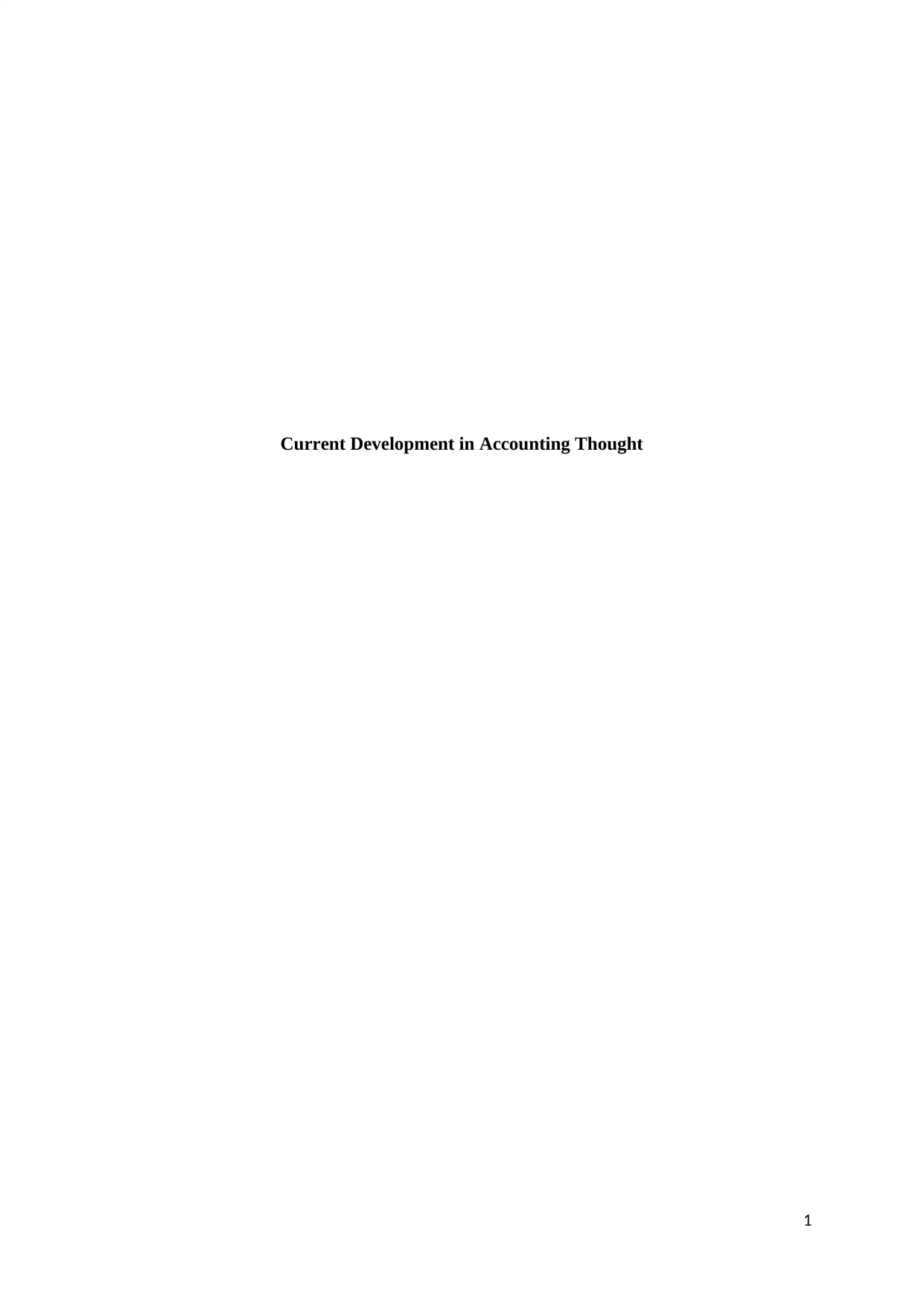
Current Development in Accounting Thought
1
1
Paraphrase This Document
Need a fresh take? Get an instant paraphrase of this document with our AI Paraphraser
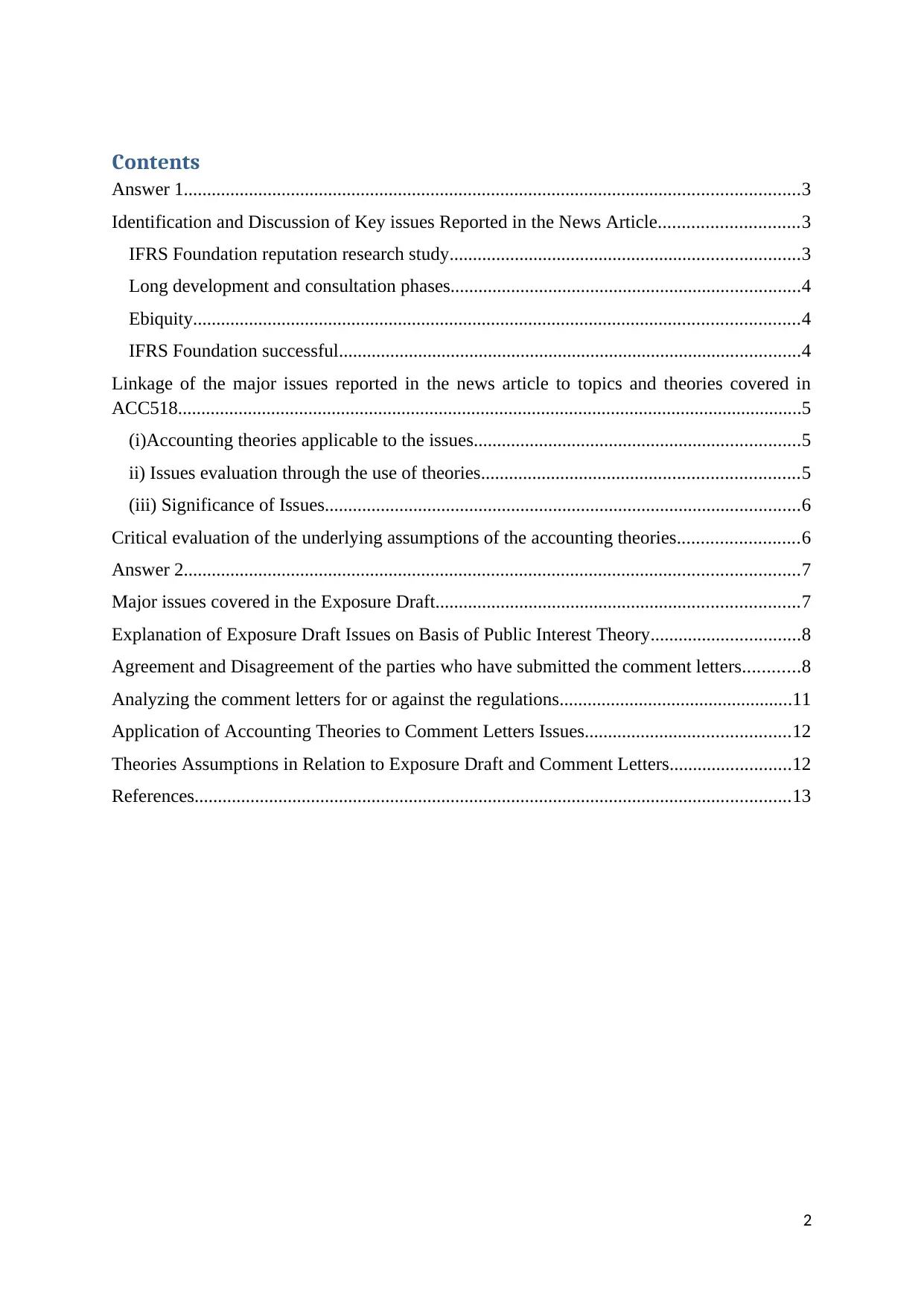
Contents
Answer 1....................................................................................................................................3
Identification and Discussion of Key issues Reported in the News Article..............................3
IFRS Foundation reputation research study...........................................................................3
Long development and consultation phases...........................................................................4
Ebiquity..................................................................................................................................4
IFRS Foundation successful...................................................................................................4
Linkage of the major issues reported in the news article to topics and theories covered in
ACC518......................................................................................................................................5
(i)Accounting theories applicable to the issues......................................................................5
ii) Issues evaluation through the use of theories....................................................................5
(iii) Significance of Issues......................................................................................................6
Critical evaluation of the underlying assumptions of the accounting theories..........................6
Answer 2....................................................................................................................................7
Major issues covered in the Exposure Draft..............................................................................7
Explanation of Exposure Draft Issues on Basis of Public Interest Theory................................8
Agreement and Disagreement of the parties who have submitted the comment letters............8
Analyzing the comment letters for or against the regulations..................................................11
Application of Accounting Theories to Comment Letters Issues............................................12
Theories Assumptions in Relation to Exposure Draft and Comment Letters..........................12
References................................................................................................................................13
2
Answer 1....................................................................................................................................3
Identification and Discussion of Key issues Reported in the News Article..............................3
IFRS Foundation reputation research study...........................................................................3
Long development and consultation phases...........................................................................4
Ebiquity..................................................................................................................................4
IFRS Foundation successful...................................................................................................4
Linkage of the major issues reported in the news article to topics and theories covered in
ACC518......................................................................................................................................5
(i)Accounting theories applicable to the issues......................................................................5
ii) Issues evaluation through the use of theories....................................................................5
(iii) Significance of Issues......................................................................................................6
Critical evaluation of the underlying assumptions of the accounting theories..........................6
Answer 2....................................................................................................................................7
Major issues covered in the Exposure Draft..............................................................................7
Explanation of Exposure Draft Issues on Basis of Public Interest Theory................................8
Agreement and Disagreement of the parties who have submitted the comment letters............8
Analyzing the comment letters for or against the regulations..................................................11
Application of Accounting Theories to Comment Letters Issues............................................12
Theories Assumptions in Relation to Exposure Draft and Comment Letters..........................12
References................................................................................................................................13
2
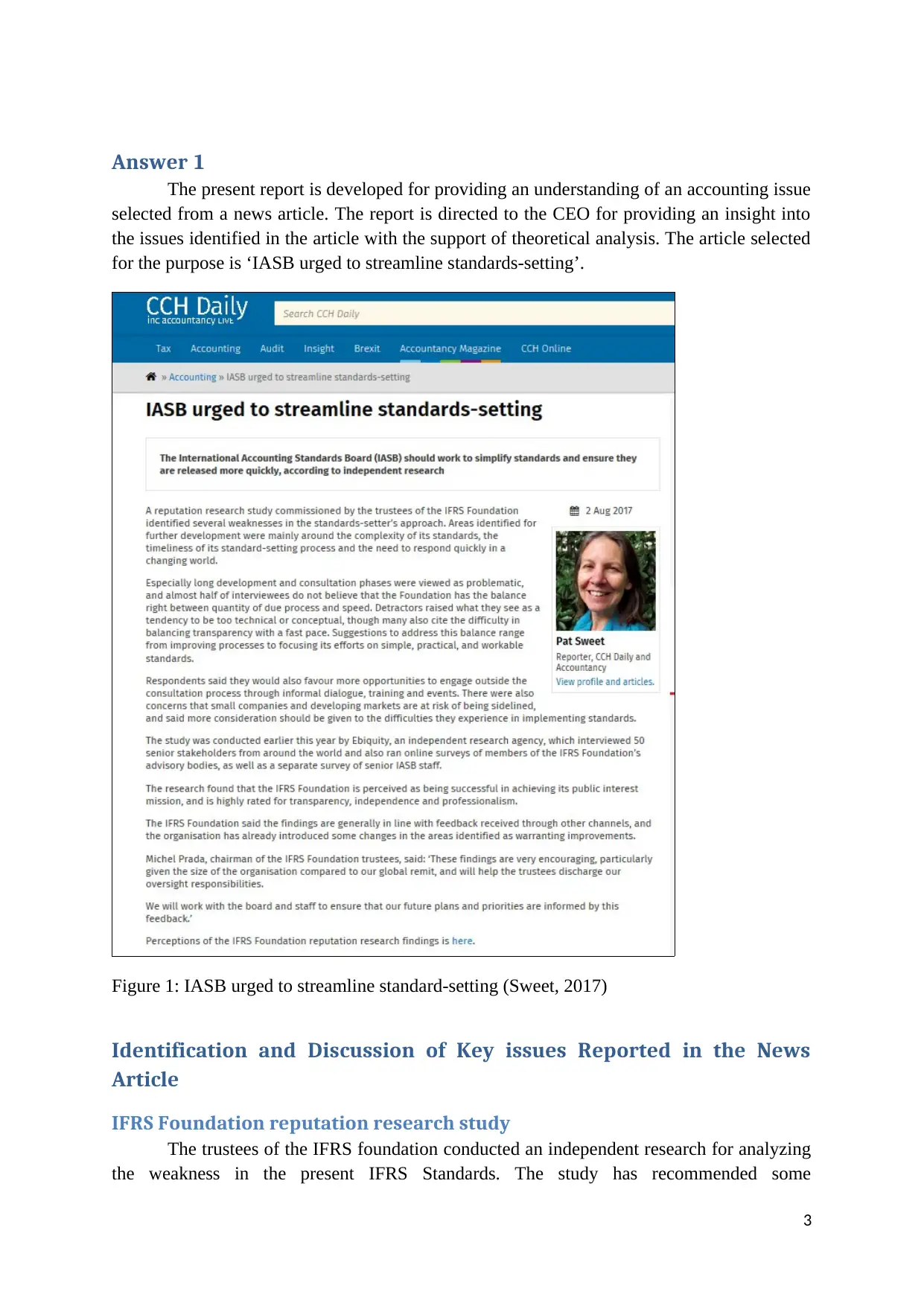
Answer 1
The present report is developed for providing an understanding of an accounting issue
selected from a news article. The report is directed to the CEO for providing an insight into
the issues identified in the article with the support of theoretical analysis. The article selected
for the purpose is ‘IASB urged to streamline standards-setting’.
Figure 1: IASB urged to streamline standard-setting (Sweet, 2017)
Identification and Discussion of Key issues Reported in the News
Article
IFRS Foundation reputation research study
The trustees of the IFRS foundation conducted an independent research for analyzing
the weakness in the present IFRS Standards. The study has recommended some
3
The present report is developed for providing an understanding of an accounting issue
selected from a news article. The report is directed to the CEO for providing an insight into
the issues identified in the article with the support of theoretical analysis. The article selected
for the purpose is ‘IASB urged to streamline standards-setting’.
Figure 1: IASB urged to streamline standard-setting (Sweet, 2017)
Identification and Discussion of Key issues Reported in the News
Article
IFRS Foundation reputation research study
The trustees of the IFRS foundation conducted an independent research for analyzing
the weakness in the present IFRS Standards. The study has recommended some
3
⊘ This is a preview!⊘
Do you want full access?
Subscribe today to unlock all pages.

Trusted by 1+ million students worldwide
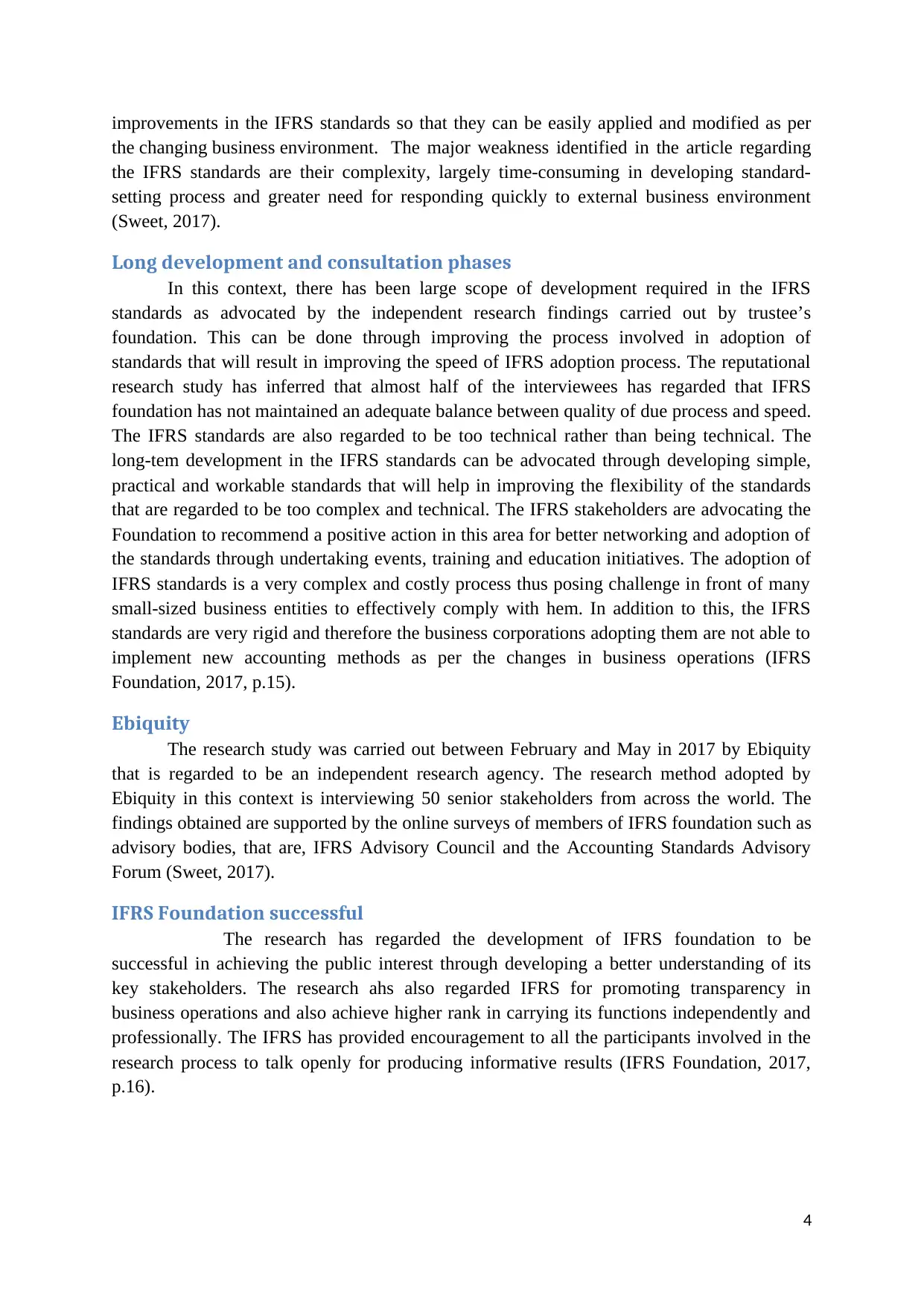
improvements in the IFRS standards so that they can be easily applied and modified as per
the changing business environment. The major weakness identified in the article regarding
the IFRS standards are their complexity, largely time-consuming in developing standard-
setting process and greater need for responding quickly to external business environment
(Sweet, 2017).
Long development and consultation phases
In this context, there has been large scope of development required in the IFRS
standards as advocated by the independent research findings carried out by trustee’s
foundation. This can be done through improving the process involved in adoption of
standards that will result in improving the speed of IFRS adoption process. The reputational
research study has inferred that almost half of the interviewees has regarded that IFRS
foundation has not maintained an adequate balance between quality of due process and speed.
The IFRS standards are also regarded to be too technical rather than being technical. The
long-tem development in the IFRS standards can be advocated through developing simple,
practical and workable standards that will help in improving the flexibility of the standards
that are regarded to be too complex and technical. The IFRS stakeholders are advocating the
Foundation to recommend a positive action in this area for better networking and adoption of
the standards through undertaking events, training and education initiatives. The adoption of
IFRS standards is a very complex and costly process thus posing challenge in front of many
small-sized business entities to effectively comply with hem. In addition to this, the IFRS
standards are very rigid and therefore the business corporations adopting them are not able to
implement new accounting methods as per the changes in business operations (IFRS
Foundation, 2017, p.15).
Ebiquity
The research study was carried out between February and May in 2017 by Ebiquity
that is regarded to be an independent research agency. The research method adopted by
Ebiquity in this context is interviewing 50 senior stakeholders from across the world. The
findings obtained are supported by the online surveys of members of IFRS foundation such as
advisory bodies, that are, IFRS Advisory Council and the Accounting Standards Advisory
Forum (Sweet, 2017).
IFRS Foundation successful
The research has regarded the development of IFRS foundation to be
successful in achieving the public interest through developing a better understanding of its
key stakeholders. The research ahs also regarded IFRS for promoting transparency in
business operations and also achieve higher rank in carrying its functions independently and
professionally. The IFRS has provided encouragement to all the participants involved in the
research process to talk openly for producing informative results (IFRS Foundation, 2017,
p.16).
4
the changing business environment. The major weakness identified in the article regarding
the IFRS standards are their complexity, largely time-consuming in developing standard-
setting process and greater need for responding quickly to external business environment
(Sweet, 2017).
Long development and consultation phases
In this context, there has been large scope of development required in the IFRS
standards as advocated by the independent research findings carried out by trustee’s
foundation. This can be done through improving the process involved in adoption of
standards that will result in improving the speed of IFRS adoption process. The reputational
research study has inferred that almost half of the interviewees has regarded that IFRS
foundation has not maintained an adequate balance between quality of due process and speed.
The IFRS standards are also regarded to be too technical rather than being technical. The
long-tem development in the IFRS standards can be advocated through developing simple,
practical and workable standards that will help in improving the flexibility of the standards
that are regarded to be too complex and technical. The IFRS stakeholders are advocating the
Foundation to recommend a positive action in this area for better networking and adoption of
the standards through undertaking events, training and education initiatives. The adoption of
IFRS standards is a very complex and costly process thus posing challenge in front of many
small-sized business entities to effectively comply with hem. In addition to this, the IFRS
standards are very rigid and therefore the business corporations adopting them are not able to
implement new accounting methods as per the changes in business operations (IFRS
Foundation, 2017, p.15).
Ebiquity
The research study was carried out between February and May in 2017 by Ebiquity
that is regarded to be an independent research agency. The research method adopted by
Ebiquity in this context is interviewing 50 senior stakeholders from across the world. The
findings obtained are supported by the online surveys of members of IFRS foundation such as
advisory bodies, that are, IFRS Advisory Council and the Accounting Standards Advisory
Forum (Sweet, 2017).
IFRS Foundation successful
The research has regarded the development of IFRS foundation to be
successful in achieving the public interest through developing a better understanding of its
key stakeholders. The research ahs also regarded IFRS for promoting transparency in
business operations and also achieve higher rank in carrying its functions independently and
professionally. The IFRS has provided encouragement to all the participants involved in the
research process to talk openly for producing informative results (IFRS Foundation, 2017,
p.16).
4
Paraphrase This Document
Need a fresh take? Get an instant paraphrase of this document with our AI Paraphraser
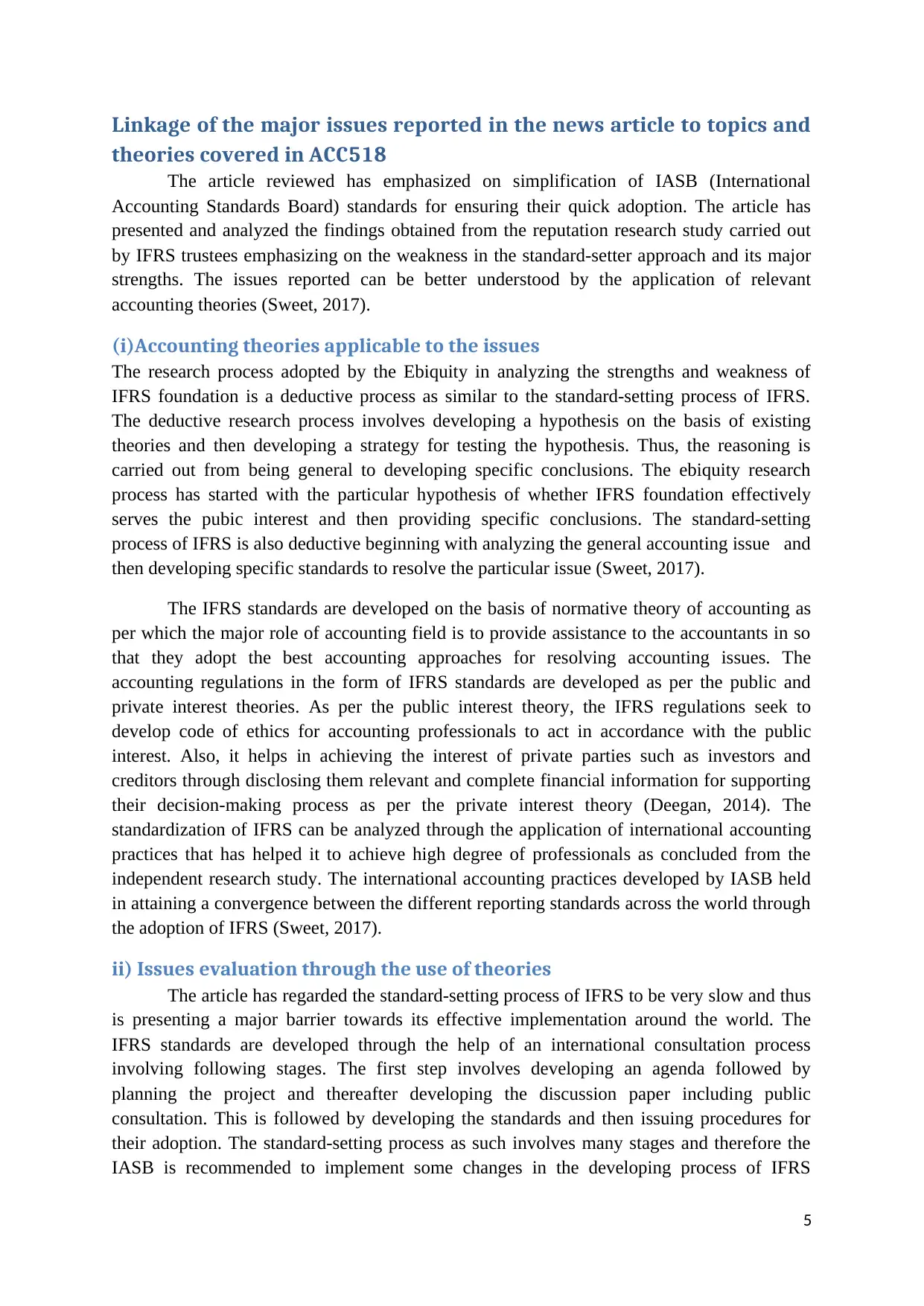
Linkage of the major issues reported in the news article to topics and
theories covered in ACC518
The article reviewed has emphasized on simplification of IASB (International
Accounting Standards Board) standards for ensuring their quick adoption. The article has
presented and analyzed the findings obtained from the reputation research study carried out
by IFRS trustees emphasizing on the weakness in the standard-setter approach and its major
strengths. The issues reported can be better understood by the application of relevant
accounting theories (Sweet, 2017).
(i)Accounting theories applicable to the issues
The research process adopted by the Ebiquity in analyzing the strengths and weakness of
IFRS foundation is a deductive process as similar to the standard-setting process of IFRS.
The deductive research process involves developing a hypothesis on the basis of existing
theories and then developing a strategy for testing the hypothesis. Thus, the reasoning is
carried out from being general to developing specific conclusions. The ebiquity research
process has started with the particular hypothesis of whether IFRS foundation effectively
serves the pubic interest and then providing specific conclusions. The standard-setting
process of IFRS is also deductive beginning with analyzing the general accounting issue and
then developing specific standards to resolve the particular issue (Sweet, 2017).
The IFRS standards are developed on the basis of normative theory of accounting as
per which the major role of accounting field is to provide assistance to the accountants in so
that they adopt the best accounting approaches for resolving accounting issues. The
accounting regulations in the form of IFRS standards are developed as per the public and
private interest theories. As per the public interest theory, the IFRS regulations seek to
develop code of ethics for accounting professionals to act in accordance with the public
interest. Also, it helps in achieving the interest of private parties such as investors and
creditors through disclosing them relevant and complete financial information for supporting
their decision-making process as per the private interest theory (Deegan, 2014). The
standardization of IFRS can be analyzed through the application of international accounting
practices that has helped it to achieve high degree of professionals as concluded from the
independent research study. The international accounting practices developed by IASB held
in attaining a convergence between the different reporting standards across the world through
the adoption of IFRS (Sweet, 2017).
ii) Issues evaluation through the use of theories
The article has regarded the standard-setting process of IFRS to be very slow and thus
is presenting a major barrier towards its effective implementation around the world. The
IFRS standards are developed through the help of an international consultation process
involving following stages. The first step involves developing an agenda followed by
planning the project and thereafter developing the discussion paper including public
consultation. This is followed by developing the standards and then issuing procedures for
their adoption. The standard-setting process as such involves many stages and therefore the
IASB is recommended to implement some changes in the developing process of IFRS
5
theories covered in ACC518
The article reviewed has emphasized on simplification of IASB (International
Accounting Standards Board) standards for ensuring their quick adoption. The article has
presented and analyzed the findings obtained from the reputation research study carried out
by IFRS trustees emphasizing on the weakness in the standard-setter approach and its major
strengths. The issues reported can be better understood by the application of relevant
accounting theories (Sweet, 2017).
(i)Accounting theories applicable to the issues
The research process adopted by the Ebiquity in analyzing the strengths and weakness of
IFRS foundation is a deductive process as similar to the standard-setting process of IFRS.
The deductive research process involves developing a hypothesis on the basis of existing
theories and then developing a strategy for testing the hypothesis. Thus, the reasoning is
carried out from being general to developing specific conclusions. The ebiquity research
process has started with the particular hypothesis of whether IFRS foundation effectively
serves the pubic interest and then providing specific conclusions. The standard-setting
process of IFRS is also deductive beginning with analyzing the general accounting issue and
then developing specific standards to resolve the particular issue (Sweet, 2017).
The IFRS standards are developed on the basis of normative theory of accounting as
per which the major role of accounting field is to provide assistance to the accountants in so
that they adopt the best accounting approaches for resolving accounting issues. The
accounting regulations in the form of IFRS standards are developed as per the public and
private interest theories. As per the public interest theory, the IFRS regulations seek to
develop code of ethics for accounting professionals to act in accordance with the public
interest. Also, it helps in achieving the interest of private parties such as investors and
creditors through disclosing them relevant and complete financial information for supporting
their decision-making process as per the private interest theory (Deegan, 2014). The
standardization of IFRS can be analyzed through the application of international accounting
practices that has helped it to achieve high degree of professionals as concluded from the
independent research study. The international accounting practices developed by IASB held
in attaining a convergence between the different reporting standards across the world through
the adoption of IFRS (Sweet, 2017).
ii) Issues evaluation through the use of theories
The article has regarded the standard-setting process of IFRS to be very slow and thus
is presenting a major barrier towards its effective implementation around the world. The
IFRS standards are developed through the help of an international consultation process
involving following stages. The first step involves developing an agenda followed by
planning the project and thereafter developing the discussion paper including public
consultation. This is followed by developing the standards and then issuing procedures for
their adoption. The standard-setting process as such involves many stages and therefore the
IASB is recommended to implement some changes in the developing process of IFRS
5
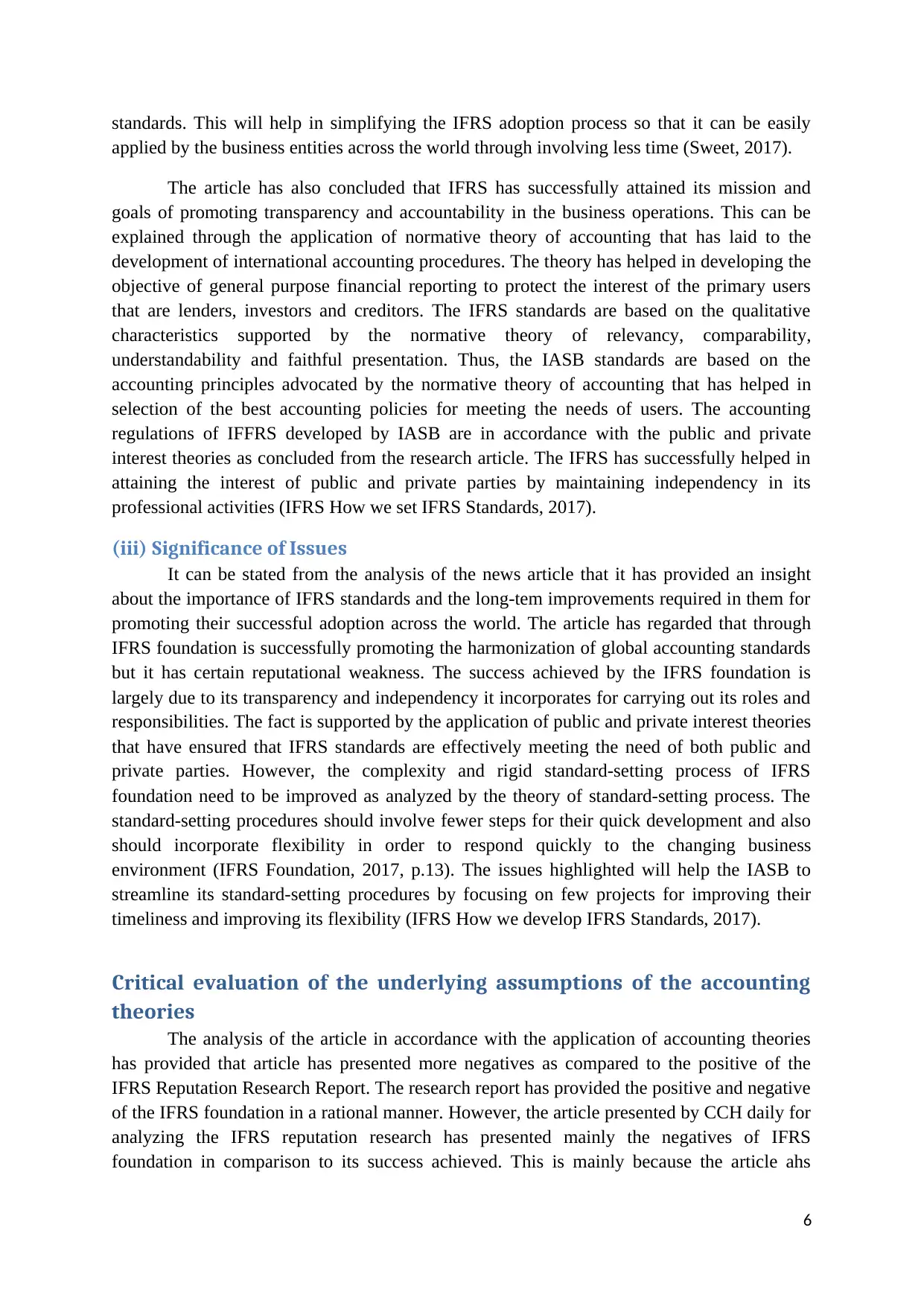
standards. This will help in simplifying the IFRS adoption process so that it can be easily
applied by the business entities across the world through involving less time (Sweet, 2017).
The article has also concluded that IFRS has successfully attained its mission and
goals of promoting transparency and accountability in the business operations. This can be
explained through the application of normative theory of accounting that has laid to the
development of international accounting procedures. The theory has helped in developing the
objective of general purpose financial reporting to protect the interest of the primary users
that are lenders, investors and creditors. The IFRS standards are based on the qualitative
characteristics supported by the normative theory of relevancy, comparability,
understandability and faithful presentation. Thus, the IASB standards are based on the
accounting principles advocated by the normative theory of accounting that has helped in
selection of the best accounting policies for meeting the needs of users. The accounting
regulations of IFFRS developed by IASB are in accordance with the public and private
interest theories as concluded from the research article. The IFRS has successfully helped in
attaining the interest of public and private parties by maintaining independency in its
professional activities (IFRS How we set IFRS Standards, 2017).
(iii) Significance of Issues
It can be stated from the analysis of the news article that it has provided an insight
about the importance of IFRS standards and the long-tem improvements required in them for
promoting their successful adoption across the world. The article has regarded that through
IFRS foundation is successfully promoting the harmonization of global accounting standards
but it has certain reputational weakness. The success achieved by the IFRS foundation is
largely due to its transparency and independency it incorporates for carrying out its roles and
responsibilities. The fact is supported by the application of public and private interest theories
that have ensured that IFRS standards are effectively meeting the need of both public and
private parties. However, the complexity and rigid standard-setting process of IFRS
foundation need to be improved as analyzed by the theory of standard-setting process. The
standard-setting procedures should involve fewer steps for their quick development and also
should incorporate flexibility in order to respond quickly to the changing business
environment (IFRS Foundation, 2017, p.13). The issues highlighted will help the IASB to
streamline its standard-setting procedures by focusing on few projects for improving their
timeliness and improving its flexibility (IFRS How we develop IFRS Standards, 2017).
Critical evaluation of the underlying assumptions of the accounting
theories
The analysis of the article in accordance with the application of accounting theories
has provided that article has presented more negatives as compared to the positive of the
IFRS Reputation Research Report. The research report has provided the positive and negative
of the IFRS foundation in a rational manner. However, the article presented by CCH daily for
analyzing the IFRS reputation research has presented mainly the negatives of IFRS
foundation in comparison to its success achieved. This is mainly because the article ahs
6
applied by the business entities across the world through involving less time (Sweet, 2017).
The article has also concluded that IFRS has successfully attained its mission and
goals of promoting transparency and accountability in the business operations. This can be
explained through the application of normative theory of accounting that has laid to the
development of international accounting procedures. The theory has helped in developing the
objective of general purpose financial reporting to protect the interest of the primary users
that are lenders, investors and creditors. The IFRS standards are based on the qualitative
characteristics supported by the normative theory of relevancy, comparability,
understandability and faithful presentation. Thus, the IASB standards are based on the
accounting principles advocated by the normative theory of accounting that has helped in
selection of the best accounting policies for meeting the needs of users. The accounting
regulations of IFFRS developed by IASB are in accordance with the public and private
interest theories as concluded from the research article. The IFRS has successfully helped in
attaining the interest of public and private parties by maintaining independency in its
professional activities (IFRS How we set IFRS Standards, 2017).
(iii) Significance of Issues
It can be stated from the analysis of the news article that it has provided an insight
about the importance of IFRS standards and the long-tem improvements required in them for
promoting their successful adoption across the world. The article has regarded that through
IFRS foundation is successfully promoting the harmonization of global accounting standards
but it has certain reputational weakness. The success achieved by the IFRS foundation is
largely due to its transparency and independency it incorporates for carrying out its roles and
responsibilities. The fact is supported by the application of public and private interest theories
that have ensured that IFRS standards are effectively meeting the need of both public and
private parties. However, the complexity and rigid standard-setting process of IFRS
foundation need to be improved as analyzed by the theory of standard-setting process. The
standard-setting procedures should involve fewer steps for their quick development and also
should incorporate flexibility in order to respond quickly to the changing business
environment (IFRS Foundation, 2017, p.13). The issues highlighted will help the IASB to
streamline its standard-setting procedures by focusing on few projects for improving their
timeliness and improving its flexibility (IFRS How we develop IFRS Standards, 2017).
Critical evaluation of the underlying assumptions of the accounting
theories
The analysis of the article in accordance with the application of accounting theories
has provided that article has presented more negatives as compared to the positive of the
IFRS Reputation Research Report. The research report has provided the positive and negative
of the IFRS foundation in a rational manner. However, the article presented by CCH daily for
analyzing the IFRS reputation research has presented mainly the negatives of IFRS
foundation in comparison to its success achieved. This is mainly because the article ahs
6
⊘ This is a preview!⊘
Do you want full access?
Subscribe today to unlock all pages.

Trusted by 1+ million students worldwide
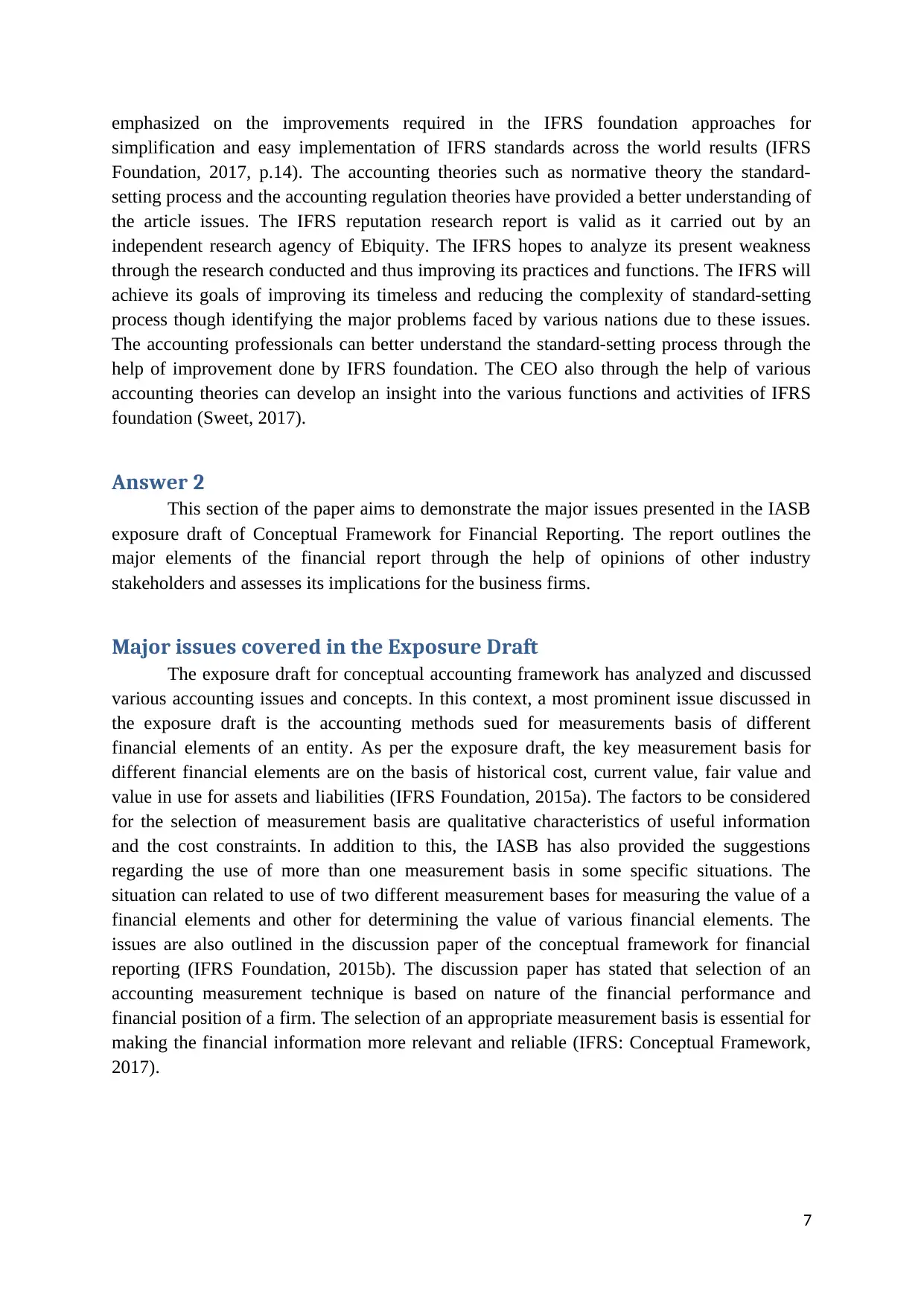
emphasized on the improvements required in the IFRS foundation approaches for
simplification and easy implementation of IFRS standards across the world results (IFRS
Foundation, 2017, p.14). The accounting theories such as normative theory the standard-
setting process and the accounting regulation theories have provided a better understanding of
the article issues. The IFRS reputation research report is valid as it carried out by an
independent research agency of Ebiquity. The IFRS hopes to analyze its present weakness
through the research conducted and thus improving its practices and functions. The IFRS will
achieve its goals of improving its timeless and reducing the complexity of standard-setting
process though identifying the major problems faced by various nations due to these issues.
The accounting professionals can better understand the standard-setting process through the
help of improvement done by IFRS foundation. The CEO also through the help of various
accounting theories can develop an insight into the various functions and activities of IFRS
foundation (Sweet, 2017).
Answer 2
This section of the paper aims to demonstrate the major issues presented in the IASB
exposure draft of Conceptual Framework for Financial Reporting. The report outlines the
major elements of the financial report through the help of opinions of other industry
stakeholders and assesses its implications for the business firms.
Major issues covered in the Exposure Draft
The exposure draft for conceptual accounting framework has analyzed and discussed
various accounting issues and concepts. In this context, a most prominent issue discussed in
the exposure draft is the accounting methods sued for measurements basis of different
financial elements of an entity. As per the exposure draft, the key measurement basis for
different financial elements are on the basis of historical cost, current value, fair value and
value in use for assets and liabilities (IFRS Foundation, 2015a). The factors to be considered
for the selection of measurement basis are qualitative characteristics of useful information
and the cost constraints. In addition to this, the IASB has also provided the suggestions
regarding the use of more than one measurement basis in some specific situations. The
situation can related to use of two different measurement bases for measuring the value of a
financial elements and other for determining the value of various financial elements. The
issues are also outlined in the discussion paper of the conceptual framework for financial
reporting (IFRS Foundation, 2015b). The discussion paper has stated that selection of an
accounting measurement technique is based on nature of the financial performance and
financial position of a firm. The selection of an appropriate measurement basis is essential for
making the financial information more relevant and reliable (IFRS: Conceptual Framework,
2017).
7
simplification and easy implementation of IFRS standards across the world results (IFRS
Foundation, 2017, p.14). The accounting theories such as normative theory the standard-
setting process and the accounting regulation theories have provided a better understanding of
the article issues. The IFRS reputation research report is valid as it carried out by an
independent research agency of Ebiquity. The IFRS hopes to analyze its present weakness
through the research conducted and thus improving its practices and functions. The IFRS will
achieve its goals of improving its timeless and reducing the complexity of standard-setting
process though identifying the major problems faced by various nations due to these issues.
The accounting professionals can better understand the standard-setting process through the
help of improvement done by IFRS foundation. The CEO also through the help of various
accounting theories can develop an insight into the various functions and activities of IFRS
foundation (Sweet, 2017).
Answer 2
This section of the paper aims to demonstrate the major issues presented in the IASB
exposure draft of Conceptual Framework for Financial Reporting. The report outlines the
major elements of the financial report through the help of opinions of other industry
stakeholders and assesses its implications for the business firms.
Major issues covered in the Exposure Draft
The exposure draft for conceptual accounting framework has analyzed and discussed
various accounting issues and concepts. In this context, a most prominent issue discussed in
the exposure draft is the accounting methods sued for measurements basis of different
financial elements of an entity. As per the exposure draft, the key measurement basis for
different financial elements are on the basis of historical cost, current value, fair value and
value in use for assets and liabilities (IFRS Foundation, 2015a). The factors to be considered
for the selection of measurement basis are qualitative characteristics of useful information
and the cost constraints. In addition to this, the IASB has also provided the suggestions
regarding the use of more than one measurement basis in some specific situations. The
situation can related to use of two different measurement bases for measuring the value of a
financial elements and other for determining the value of various financial elements. The
issues are also outlined in the discussion paper of the conceptual framework for financial
reporting (IFRS Foundation, 2015b). The discussion paper has stated that selection of an
accounting measurement technique is based on nature of the financial performance and
financial position of a firm. The selection of an appropriate measurement basis is essential for
making the financial information more relevant and reliable (IFRS: Conceptual Framework,
2017).
7
Paraphrase This Document
Need a fresh take? Get an instant paraphrase of this document with our AI Paraphraser
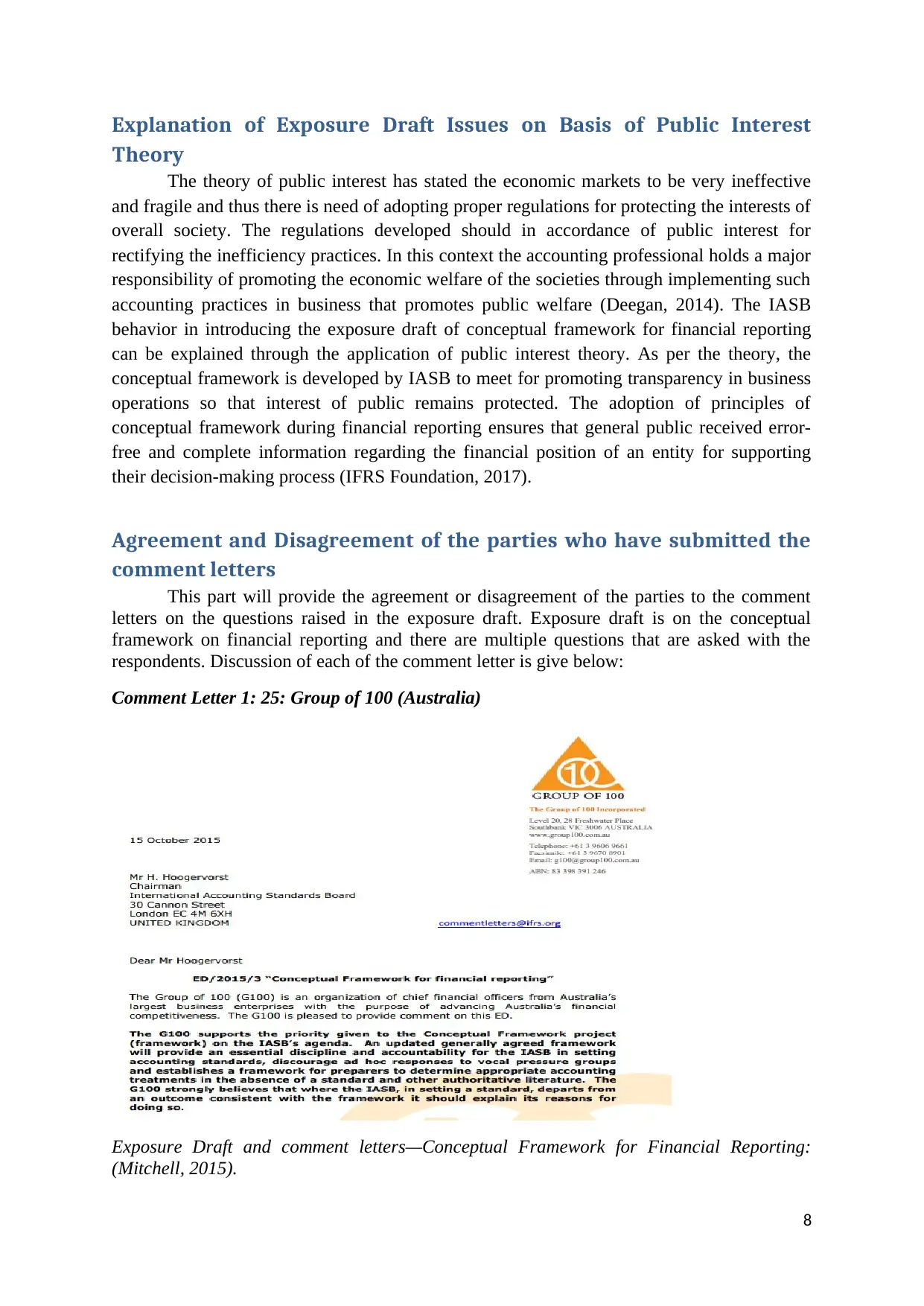
Explanation of Exposure Draft Issues on Basis of Public Interest
Theory
The theory of public interest has stated the economic markets to be very ineffective
and fragile and thus there is need of adopting proper regulations for protecting the interests of
overall society. The regulations developed should in accordance of public interest for
rectifying the inefficiency practices. In this context the accounting professional holds a major
responsibility of promoting the economic welfare of the societies through implementing such
accounting practices in business that promotes public welfare (Deegan, 2014). The IASB
behavior in introducing the exposure draft of conceptual framework for financial reporting
can be explained through the application of public interest theory. As per the theory, the
conceptual framework is developed by IASB to meet for promoting transparency in business
operations so that interest of public remains protected. The adoption of principles of
conceptual framework during financial reporting ensures that general public received error-
free and complete information regarding the financial position of an entity for supporting
their decision-making process (IFRS Foundation, 2017).
Agreement and Disagreement of the parties who have submitted the
comment letters
This part will provide the agreement or disagreement of the parties to the comment
letters on the questions raised in the exposure draft. Exposure draft is on the conceptual
framework on financial reporting and there are multiple questions that are asked with the
respondents. Discussion of each of the comment letter is give below:
Comment Letter 1: 25: Group of 100 (Australia)
Exposure Draft and comment letters—Conceptual Framework for Financial Reporting:
(Mitchell, 2015).
8
Theory
The theory of public interest has stated the economic markets to be very ineffective
and fragile and thus there is need of adopting proper regulations for protecting the interests of
overall society. The regulations developed should in accordance of public interest for
rectifying the inefficiency practices. In this context the accounting professional holds a major
responsibility of promoting the economic welfare of the societies through implementing such
accounting practices in business that promotes public welfare (Deegan, 2014). The IASB
behavior in introducing the exposure draft of conceptual framework for financial reporting
can be explained through the application of public interest theory. As per the theory, the
conceptual framework is developed by IASB to meet for promoting transparency in business
operations so that interest of public remains protected. The adoption of principles of
conceptual framework during financial reporting ensures that general public received error-
free and complete information regarding the financial position of an entity for supporting
their decision-making process (IFRS Foundation, 2017).
Agreement and Disagreement of the parties who have submitted the
comment letters
This part will provide the agreement or disagreement of the parties to the comment
letters on the questions raised in the exposure draft. Exposure draft is on the conceptual
framework on financial reporting and there are multiple questions that are asked with the
respondents. Discussion of each of the comment letter is give below:
Comment Letter 1: 25: Group of 100 (Australia)
Exposure Draft and comment letters—Conceptual Framework for Financial Reporting:
(Mitchell, 2015).
8
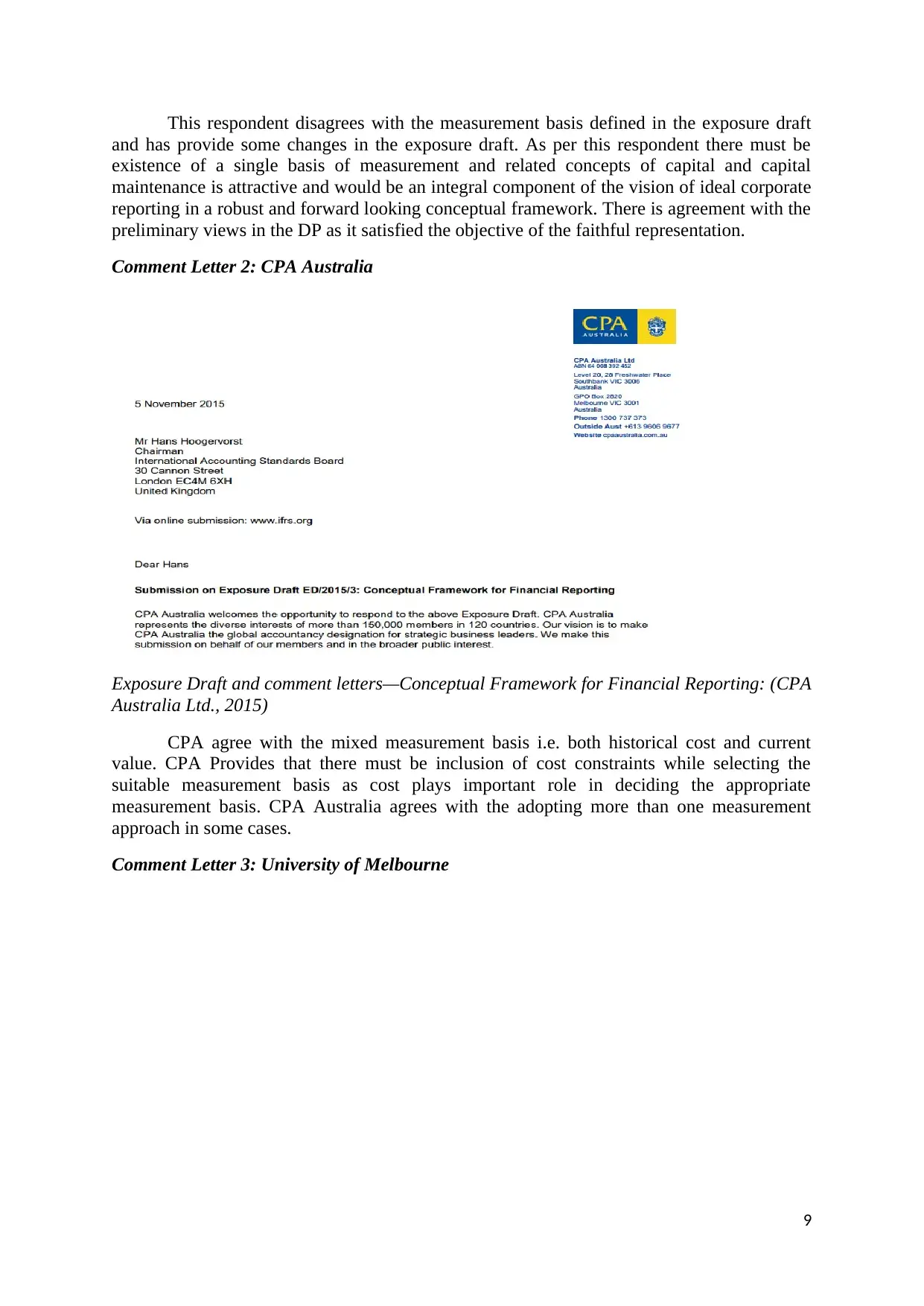
This respondent disagrees with the measurement basis defined in the exposure draft
and has provide some changes in the exposure draft. As per this respondent there must be
existence of a single basis of measurement and related concepts of capital and capital
maintenance is attractive and would be an integral component of the vision of ideal corporate
reporting in a robust and forward looking conceptual framework. There is agreement with the
preliminary views in the DP as it satisfied the objective of the faithful representation.
Comment Letter 2: CPA Australia
Exposure Draft and comment letters—Conceptual Framework for Financial Reporting: (CPA
Australia Ltd., 2015)
CPA agree with the mixed measurement basis i.e. both historical cost and current
value. CPA Provides that there must be inclusion of cost constraints while selecting the
suitable measurement basis as cost plays important role in deciding the appropriate
measurement basis. CPA Australia agrees with the adopting more than one measurement
approach in some cases.
Comment Letter 3: University of Melbourne
9
and has provide some changes in the exposure draft. As per this respondent there must be
existence of a single basis of measurement and related concepts of capital and capital
maintenance is attractive and would be an integral component of the vision of ideal corporate
reporting in a robust and forward looking conceptual framework. There is agreement with the
preliminary views in the DP as it satisfied the objective of the faithful representation.
Comment Letter 2: CPA Australia
Exposure Draft and comment letters—Conceptual Framework for Financial Reporting: (CPA
Australia Ltd., 2015)
CPA agree with the mixed measurement basis i.e. both historical cost and current
value. CPA Provides that there must be inclusion of cost constraints while selecting the
suitable measurement basis as cost plays important role in deciding the appropriate
measurement basis. CPA Australia agrees with the adopting more than one measurement
approach in some cases.
Comment Letter 3: University of Melbourne
9
⊘ This is a preview!⊘
Do you want full access?
Subscribe today to unlock all pages.

Trusted by 1+ million students worldwide
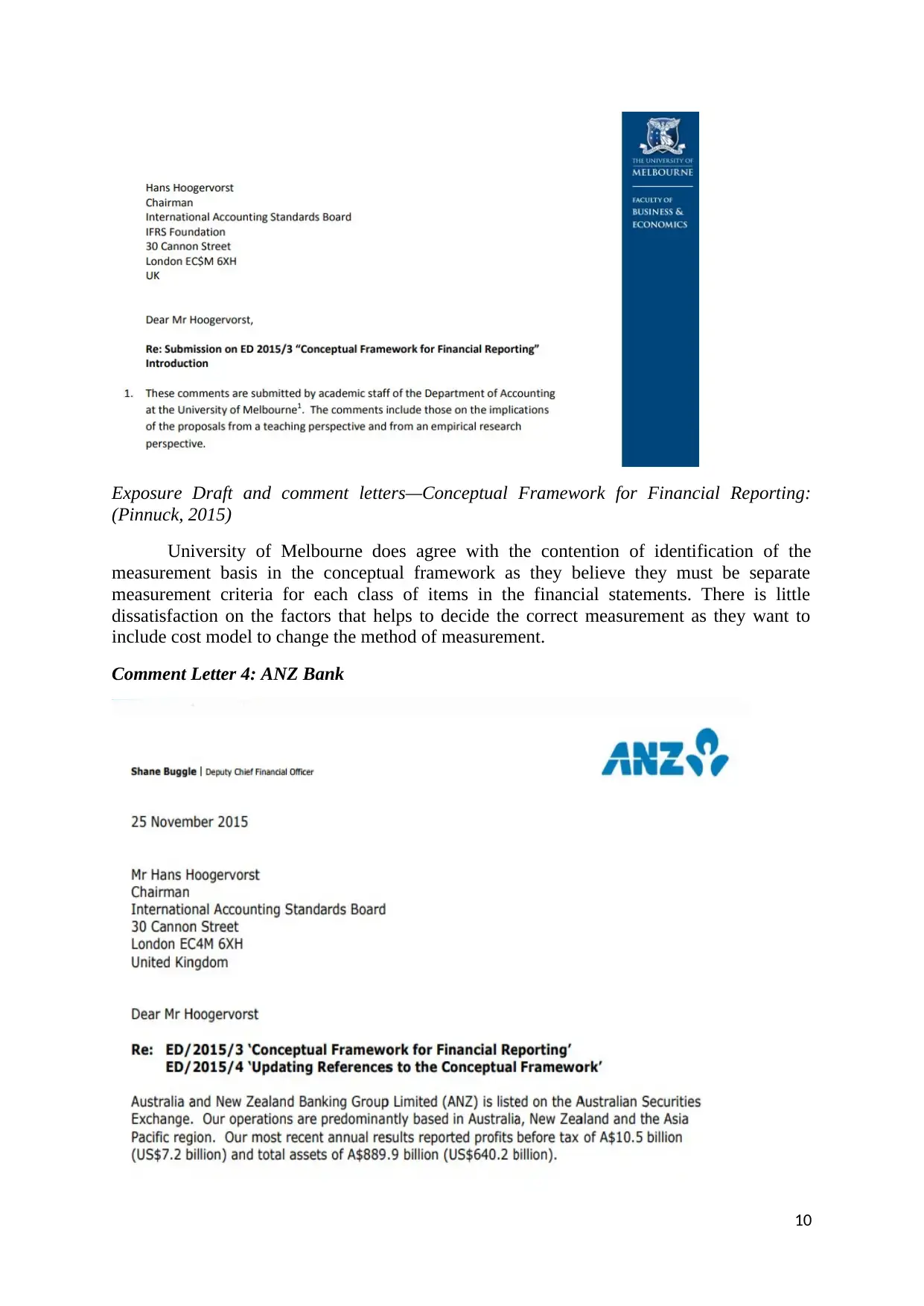
Exposure Draft and comment letters—Conceptual Framework for Financial Reporting:
(Pinnuck, 2015)
University of Melbourne does agree with the contention of identification of the
measurement basis in the conceptual framework as they believe they must be separate
measurement criteria for each class of items in the financial statements. There is little
dissatisfaction on the factors that helps to decide the correct measurement as they want to
include cost model to change the method of measurement.
Comment Letter 4: ANZ Bank
10
(Pinnuck, 2015)
University of Melbourne does agree with the contention of identification of the
measurement basis in the conceptual framework as they believe they must be separate
measurement criteria for each class of items in the financial statements. There is little
dissatisfaction on the factors that helps to decide the correct measurement as they want to
include cost model to change the method of measurement.
Comment Letter 4: ANZ Bank
10
Paraphrase This Document
Need a fresh take? Get an instant paraphrase of this document with our AI Paraphraser
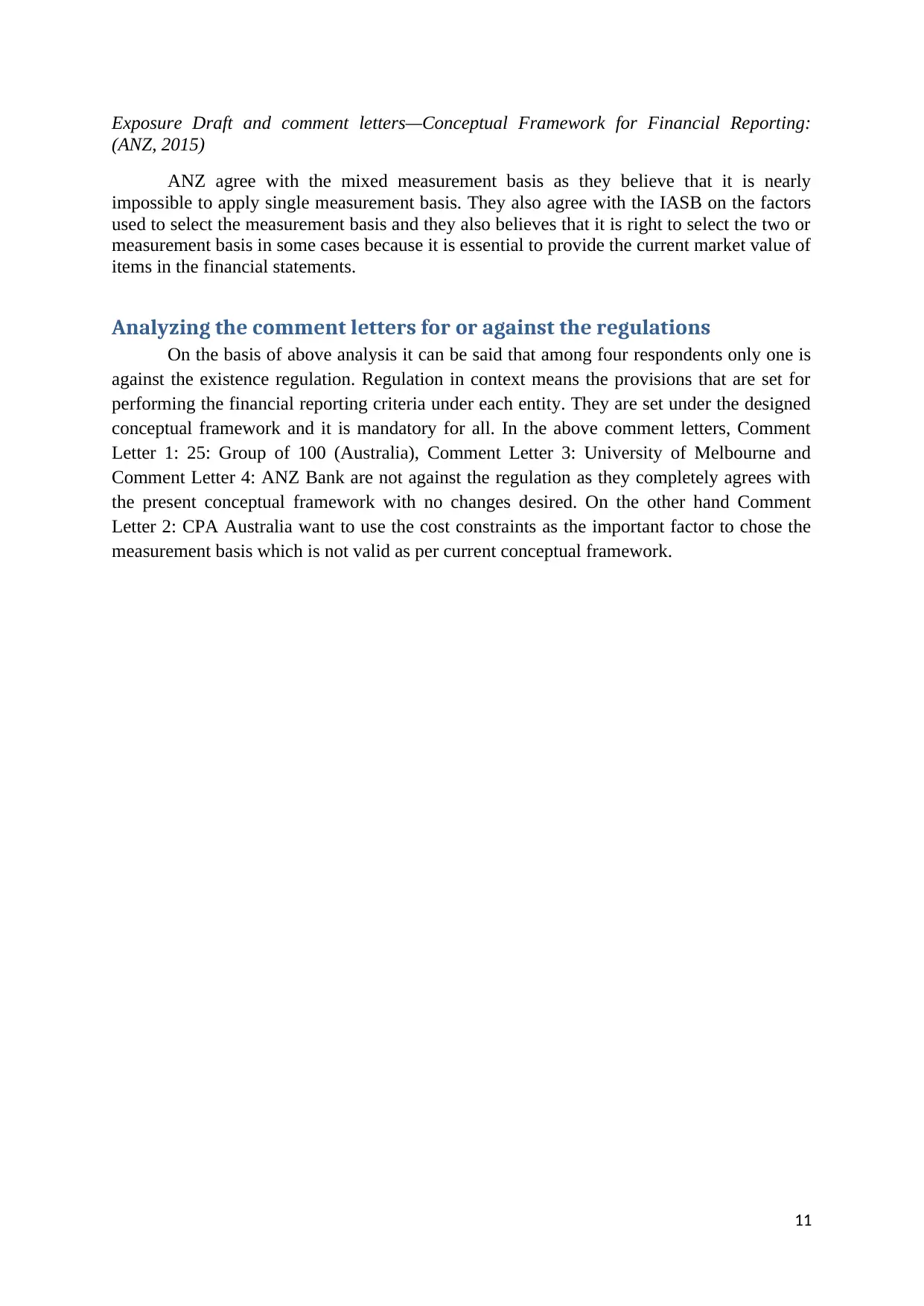
Exposure Draft and comment letters—Conceptual Framework for Financial Reporting:
(ANZ, 2015)
ANZ agree with the mixed measurement basis as they believe that it is nearly
impossible to apply single measurement basis. They also agree with the IASB on the factors
used to select the measurement basis and they also believes that it is right to select the two or
measurement basis in some cases because it is essential to provide the current market value of
items in the financial statements.
Analyzing the comment letters for or against the regulations
On the basis of above analysis it can be said that among four respondents only one is
against the existence regulation. Regulation in context means the provisions that are set for
performing the financial reporting criteria under each entity. They are set under the designed
conceptual framework and it is mandatory for all. In the above comment letters, Comment
Letter 1: 25: Group of 100 (Australia), Comment Letter 3: University of Melbourne and
Comment Letter 4: ANZ Bank are not against the regulation as they completely agrees with
the present conceptual framework with no changes desired. On the other hand Comment
Letter 2: CPA Australia want to use the cost constraints as the important factor to chose the
measurement basis which is not valid as per current conceptual framework.
11
(ANZ, 2015)
ANZ agree with the mixed measurement basis as they believe that it is nearly
impossible to apply single measurement basis. They also agree with the IASB on the factors
used to select the measurement basis and they also believes that it is right to select the two or
measurement basis in some cases because it is essential to provide the current market value of
items in the financial statements.
Analyzing the comment letters for or against the regulations
On the basis of above analysis it can be said that among four respondents only one is
against the existence regulation. Regulation in context means the provisions that are set for
performing the financial reporting criteria under each entity. They are set under the designed
conceptual framework and it is mandatory for all. In the above comment letters, Comment
Letter 1: 25: Group of 100 (Australia), Comment Letter 3: University of Melbourne and
Comment Letter 4: ANZ Bank are not against the regulation as they completely agrees with
the present conceptual framework with no changes desired. On the other hand Comment
Letter 2: CPA Australia want to use the cost constraints as the important factor to chose the
measurement basis which is not valid as per current conceptual framework.
11
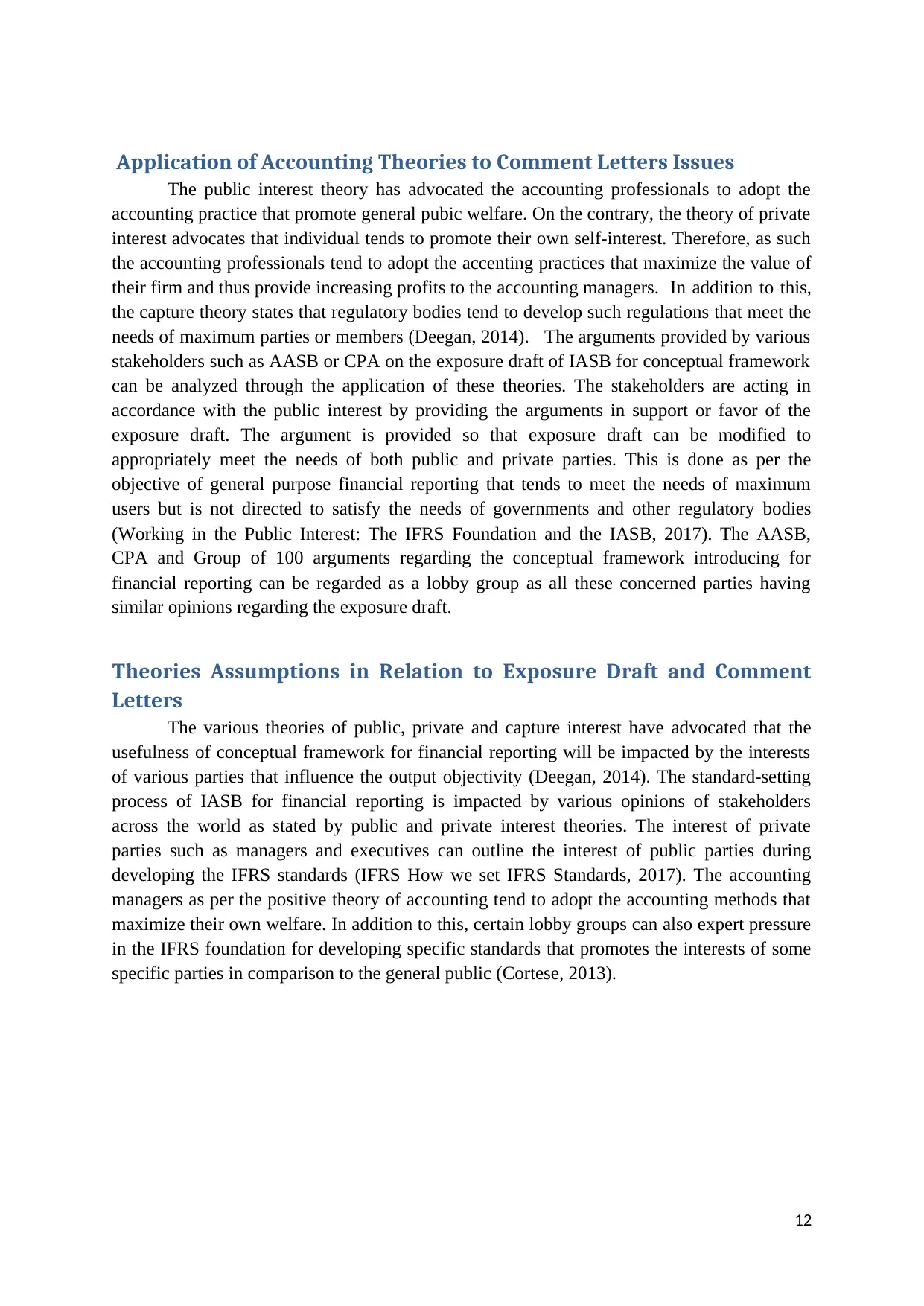
Application of Accounting Theories to Comment Letters Issues
The public interest theory has advocated the accounting professionals to adopt the
accounting practice that promote general pubic welfare. On the contrary, the theory of private
interest advocates that individual tends to promote their own self-interest. Therefore, as such
the accounting professionals tend to adopt the accenting practices that maximize the value of
their firm and thus provide increasing profits to the accounting managers. In addition to this,
the capture theory states that regulatory bodies tend to develop such regulations that meet the
needs of maximum parties or members (Deegan, 2014). The arguments provided by various
stakeholders such as AASB or CPA on the exposure draft of IASB for conceptual framework
can be analyzed through the application of these theories. The stakeholders are acting in
accordance with the public interest by providing the arguments in support or favor of the
exposure draft. The argument is provided so that exposure draft can be modified to
appropriately meet the needs of both public and private parties. This is done as per the
objective of general purpose financial reporting that tends to meet the needs of maximum
users but is not directed to satisfy the needs of governments and other regulatory bodies
(Working in the Public Interest: The IFRS Foundation and the IASB, 2017). The AASB,
CPA and Group of 100 arguments regarding the conceptual framework introducing for
financial reporting can be regarded as a lobby group as all these concerned parties having
similar opinions regarding the exposure draft.
Theories Assumptions in Relation to Exposure Draft and Comment
Letters
The various theories of public, private and capture interest have advocated that the
usefulness of conceptual framework for financial reporting will be impacted by the interests
of various parties that influence the output objectivity (Deegan, 2014). The standard-setting
process of IASB for financial reporting is impacted by various opinions of stakeholders
across the world as stated by public and private interest theories. The interest of private
parties such as managers and executives can outline the interest of public parties during
developing the IFRS standards (IFRS How we set IFRS Standards, 2017). The accounting
managers as per the positive theory of accounting tend to adopt the accounting methods that
maximize their own welfare. In addition to this, certain lobby groups can also expert pressure
in the IFRS foundation for developing specific standards that promotes the interests of some
specific parties in comparison to the general public (Cortese, 2013).
12
The public interest theory has advocated the accounting professionals to adopt the
accounting practice that promote general pubic welfare. On the contrary, the theory of private
interest advocates that individual tends to promote their own self-interest. Therefore, as such
the accounting professionals tend to adopt the accenting practices that maximize the value of
their firm and thus provide increasing profits to the accounting managers. In addition to this,
the capture theory states that regulatory bodies tend to develop such regulations that meet the
needs of maximum parties or members (Deegan, 2014). The arguments provided by various
stakeholders such as AASB or CPA on the exposure draft of IASB for conceptual framework
can be analyzed through the application of these theories. The stakeholders are acting in
accordance with the public interest by providing the arguments in support or favor of the
exposure draft. The argument is provided so that exposure draft can be modified to
appropriately meet the needs of both public and private parties. This is done as per the
objective of general purpose financial reporting that tends to meet the needs of maximum
users but is not directed to satisfy the needs of governments and other regulatory bodies
(Working in the Public Interest: The IFRS Foundation and the IASB, 2017). The AASB,
CPA and Group of 100 arguments regarding the conceptual framework introducing for
financial reporting can be regarded as a lobby group as all these concerned parties having
similar opinions regarding the exposure draft.
Theories Assumptions in Relation to Exposure Draft and Comment
Letters
The various theories of public, private and capture interest have advocated that the
usefulness of conceptual framework for financial reporting will be impacted by the interests
of various parties that influence the output objectivity (Deegan, 2014). The standard-setting
process of IASB for financial reporting is impacted by various opinions of stakeholders
across the world as stated by public and private interest theories. The interest of private
parties such as managers and executives can outline the interest of public parties during
developing the IFRS standards (IFRS How we set IFRS Standards, 2017). The accounting
managers as per the positive theory of accounting tend to adopt the accounting methods that
maximize their own welfare. In addition to this, certain lobby groups can also expert pressure
in the IFRS foundation for developing specific standards that promotes the interests of some
specific parties in comparison to the general public (Cortese, 2013).
12
⊘ This is a preview!⊘
Do you want full access?
Subscribe today to unlock all pages.

Trusted by 1+ million students worldwide
1 out of 14
Related Documents
Your All-in-One AI-Powered Toolkit for Academic Success.
+13062052269
info@desklib.com
Available 24*7 on WhatsApp / Email
![[object Object]](/_next/static/media/star-bottom.7253800d.svg)
Unlock your academic potential
Copyright © 2020–2026 A2Z Services. All Rights Reserved. Developed and managed by ZUCOL.





